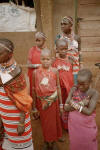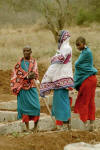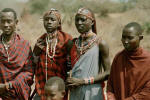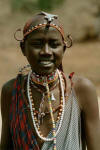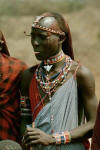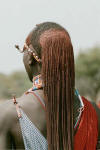welcome to worldwidewachs.com
Survivors in Kenya
(The Team that Played Together AND Stayed Together)
July 26 – August 17, 2001
July 26 – 27, 2001
We’ve traveled halfway around the world to come to Kenya. The last day and a half is a jumble of plane flights, airports and meals. It’s as if someone took the last 36 hours, tossed them up in the air, then made you live them in the order in which they tumbled back down to earth. We’ve seen 3 sunrises and 2 sunsets, been served 9 meals, passed through 5 airports.
Marvin and I, and a fellow team member named Joyce, arrived in Nairobi in the late evening, and were whisked to the Parkside Hotel. The hotel is nicer than I expected – basic but clean. There were even unexpected extras – toilet paper, hot water, flush toilets, pillows on the bed, and ta dah!! – a touch tone phone.
We’ve arrived a day early, to acclimate to the 8-hour time change, and see a bit of Nairobi. It’s our good fortune that Joyce knows a woman named Connie, who lives in Nairobi and is kind enough to squire us around for the day. Nairobi is chilly and gray today, the air just dripping with bone-deep humidity. We drive through the bustling downtown area – no lane markers or traffic lights, just your basic who can bluff whom free-for-all – and eventually find ourselves on quiet residential roads framed with poinsettia and jacaranda trees spilling out over gracefully curved walls and lawns.
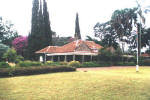 Near the suburb of Karen, we visit the Karen Blixen (the Out of Africa heroine) home, now a museum. It is a modest, but
comfortable one-floor residence, with a spacious 5 rooms and sprawling lawns.The original 600 acres of coffee plantation are now overgrown, but the
coffee-drying machine is still there.
Near the suburb of Karen, we visit the Karen Blixen (the Out of Africa heroine) home, now a museum. It is a modest, but
comfortable one-floor residence, with a spacious 5 rooms and sprawling lawns.The original 600 acres of coffee plantation are now overgrown, but the
coffee-drying machine is still there.
Just down the road is the Giraffe Center, an educational exhibit, primarily for young school children, to learn about giraffes and Kenyan wildlife issues. Marvin enjoyed feeding a young giraffe. Then it was on to the ultra-modern Salit Centre – Nairobi’s chicest mall, where we dined at the food court, checked out the goods in the local supermarket, and bought a Kenyan map in a bookstore.
July 28, 2001
And now we’re off to our real destination! The trip from Nairobi to Maili Tatu is an all day one – a gradual shift from bustling metropolis, to urban countryside, to rural countryside, to desert scrubland, to desolate stretches of dust and occasional acacias. First, there is the notorious Nairobi – Mombasa road, a paved, two-lane drag strip from hell, overrun with diesel trucks having no emission standards. After two hours, we turn onto a hard-packed dirt and gravel road that is bumpy, but quite tolerable. But the road gradually deteriorates, with jarring deep ruts that reassemble all our bones and body parts. The dust from our jeep, and from passing vehicles, is thick and choking. We pass through grimy, forlorn towns with magical names like Kimana, Salima, and finally Loitokitok. The Masai are tending their goats out in the desert scrub, their colorful orange-red body cloths swirling in the wind, and there are occasional zebras, giraffe, gazelles grazing, and even a proud ostrich strutting off in the distance.
After Loitokitok, the road becomes your worst nightmare – a narrow roller coaster of treacherous deep ruts and gullies that no human being in his right mind would try to negotiate. The dust floats by in thick clouds as we slow to traverse 3-foot ruts. And finally, 7 hours after leaving Nairobi, just as you’ve resigned yourself to a butt-numbing eternity of bouncing and jostling, you suddenly slide in to a dusty collection of tired, unpainted rickety wooden buildings in the middle of nowhere. You’ve arrived at Maili Tatu.
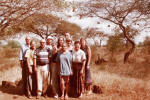 Our group is eleven people. There is a family of four – the mother Chris (a massage therapist) and her 3
daughters Mariah (a college student), Samantha and Lila (high school students) from St.
Louis; our group leader Karen, a computer specialist from Wisconsin; a college
senior named Zach from California; a photographer named Fred from Maryland; a
hotel worker from Arizona named Bill; an accountant from Kansas City named
Joyce; and Marvin and I. We range in age from 15 to 60ish, we live all over the U. S, and we have various
occupations/educational goals. We’ve all come to help a community build a health clinic, but we each have our own
personal agendas and goals for this trip. Diverse as we are, our group gels wonderfully over the coming weeks, gradually
generating that easy camaraderie that comes with living through difficult,touching and challenging circumstances.
Our group is eleven people. There is a family of four – the mother Chris (a massage therapist) and her 3
daughters Mariah (a college student), Samantha and Lila (high school students) from St.
Louis; our group leader Karen, a computer specialist from Wisconsin; a college
senior named Zach from California; a photographer named Fred from Maryland; a
hotel worker from Arizona named Bill; an accountant from Kansas City named
Joyce; and Marvin and I. We range in age from 15 to 60ish, we live all over the U. S, and we have various
occupations/educational goals. We’ve all come to help a community build a health clinic, but we each have our own
personal agendas and goals for this trip. Diverse as we are, our group gels wonderfully over the coming weeks, gradually
generating that easy camaraderie that comes with living through difficult,touching and challenging circumstances.
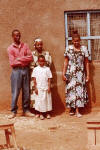
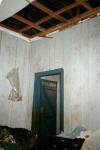 On our arrival in Maili Tatu, we find the community was prepared for only 8 of us, so accommodations are quite tight. The
four guys share a bedroom in the building which is our base of operations – the home of Saita, one of the local teachers, and his wife Monica,
who cooks most of our meals (with the help of her cousins – 19-year-old Grace, and 9-year-old Purity).
On our arrival in Maili Tatu, we find the community was prepared for only 8 of us, so accommodations are quite tight. The
four guys share a bedroom in the building which is our base of operations – the home of Saita, one of the local teachers, and his wife Monica,
who cooks most of our meals (with the help of her cousins – 19-year-old Grace, and 9-year-old Purity).
The women share two rooms in the schoolhouse – 5 of us in a 12 x 12 foot room (where we can only fit 3 single beds, but can lay a large mattress for 2 on the floor), and 2 in a back storage room that is only about 6 x 12. The resident bats, lizards, crickets, spiders and mice seem barely disturbed by our presence, and carry on as though we hadn’t really taken over their accommodations. The outside walls of the schoolhouse are cement, painted turquoise a million years ago, but now pocked with smudges and dents. The inside walls are wood, and the floor is cement.
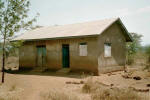 There is a tin roof, visible from our beds, since half the ceiling is missing, and there are two high windows, covered with sack cloth to maintain
privacy. When you add suitcases, backpacks and mosquito nets, the décor is early African crowded boot camp.
There is a tin roof, visible from our beds, since half the ceiling is missing, and there are two high windows, covered with sack cloth to maintain
privacy. When you add suitcases, backpacks and mosquito nets, the décor is early African crowded boot camp.
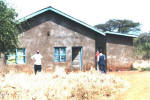 Saita and Monica’s house where we gather for meals, meetings and general
hanging out, is a veritable palace among other houses in the community. It
has four rooms – the living/dining area, about 10 x 15 feet, containing an
assortment of garage sale style chairs; Saita and Monica’s bedroom; the
bedroom where the men are installed; and a small 7 x 7 foot room that stores
the dishes and pots and pans. Across from this “kitchen/storage” room is a
small concrete patio where cooking is done on two small charcoal burners,
and dishes are washed. There are two small rooms on the other side of the
patio – one of which is used for showering, and the other as a bedroom for
Grace and Purity.
Saita and Monica’s house where we gather for meals, meetings and general
hanging out, is a veritable palace among other houses in the community. It
has four rooms – the living/dining area, about 10 x 15 feet, containing an
assortment of garage sale style chairs; Saita and Monica’s bedroom; the
bedroom where the men are installed; and a small 7 x 7 foot room that stores
the dishes and pots and pans. Across from this “kitchen/storage” room is a
small concrete patio where cooking is done on two small charcoal burners,
and dishes are washed. There are two small rooms on the other side of the
patio – one of which is used for showering, and the other as a bedroom for
Grace and Purity.
For dinner, at around 8:00, we chow down on a delicious meal of rice, chicken, boiled cabbage and beans (like kidney beans). After dinner, most of the group is so exhausted that we retire to our sleeping quarters and climb into our sleeping bags by 9:00.
July 29, 2001
It is Global Citizens Network’s (GCN) operating philosophy that all work projects must be the responsibility of the local community, that ownership of the project is best achieved when members of the community determine what they need and how to accomplish it. Thus, GCN is simply a facilitator to the community, offering some of the funding, and the participation and partnership of any international volunteers who desire to assist – by living in the community, sharing their homes and way of life, and doing whatever tasks the community has determined will be helpful.
We had arrived in Maili Tatu on Saturday. Kenya is a largely Christian country, populated with an assortment of foreign missionaries over the years from every denomination. So Sunday is a day of worship and no work – for the GCN volunteers, a day of settling in and getting our bearings. We start the day with oatmeal porridge (no milk available during our entire stay), drizzled with a little honey. The morning is dreary and gray, and my hopes of witnessing the majestic, volcanic Mt. Kilimanjaro, the highest mountain in Africa at 19,340 feet, are tabled for day one. But there is a light breeze, and a playful coolness in the air.
Chris and Joyce and Zach go to church with Monica. Lila and Mariah play with some of the local children who have flocked to the schoolhouse, overcome with curiosity. Karen and Marvin and I walk to the health clinic building site, to survey the project’s current status.
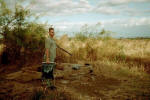
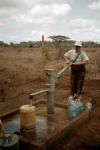 After a lunch of rice and beans (which would become a common theme over the next few
weeks), Monica shows us the wells where we can draw water. Two of the wells, one
several hundred yards away and the other maybe a quarter of a mile, are not pure
enough and are for showers and laundry only. The well with pure enough drinking water is a mile away (and
a whole lot farther coming back), down a dusty road, across a creek, and along a
path populated with monkeys and baboons. Within days we name the wells: the Angry Turkey Well is the closest one, but is often
locked, and derived its name when poor Joyce was brutally attacked by two protective turkeys who apparently didn’t want her to have the key (she bravely
fought them off with her only weapons – two plastic solar shower bags); the Tiny Man Well – the other shower water well, is owned by a tiny man, whose
family is always so courteous to us and gives us fresh papaya; and the Drinking Well is where we most often meet other villagers, and share pumping and
container-filling duties.
After a lunch of rice and beans (which would become a common theme over the next few
weeks), Monica shows us the wells where we can draw water. Two of the wells, one
several hundred yards away and the other maybe a quarter of a mile, are not pure
enough and are for showers and laundry only. The well with pure enough drinking water is a mile away (and
a whole lot farther coming back), down a dusty road, across a creek, and along a
path populated with monkeys and baboons. Within days we name the wells: the Angry Turkey Well is the closest one, but is often
locked, and derived its name when poor Joyce was brutally attacked by two protective turkeys who apparently didn’t want her to have the key (she bravely
fought them off with her only weapons – two plastic solar shower bags); the Tiny Man Well – the other shower water well, is owned by a tiny man, whose
family is always so courteous to us and gives us fresh papaya; and the Drinking Well is where we most often meet other villagers, and share pumping and
container-filling duties.
Sunday afternoon is slow and lazy, but in a peaceful, easy way. We drift in and out of the house, read, play cards, walk around and explore a little, play with gathering, curious children, show them pictures of home and explain the strange things they see – children and grandchildren, pets, houses, lawns, cars, etc. The children are wide-eyed and fascinated, and beg us to show them the pictures several times. Later, they stand at the doorway of the schoolhouse while I comb my just-washed hair, entranced with this long, light-brown stream of straight, unfrizzled tresses. All the children, male and female – except for the young Masai warrior males - have extremely close-cropped hair.
We are right at the equator, where the hours of sunlight are the same all year round – and it consistently gets light around 6:30 a.m., and consistently gets dark around 6:30 p.m. Tonight, dinner is really late. At about 8:45 we finally glommed up on soup and squashed muffins, brought from Nairobi.
July 30, 2001
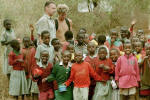 After such a peaceful morning awakening Sunday morning, we women are surprised to awaken to the bright lively chatter of the elementary school children,
their high-pitched, clipped Swahili words resounding on the steps and grounds of our schoolhouse/sleeping quarters just before 7:00. Of course,
they are gathering for the school day. Soon, however, the soft sing-song of their voices grows to a rumble and then a tumultuous din as more children
arrive, and by the time they enter the classroom immediately next to us, they are shouting and singing at full volume.We can’t hear ourselves talk,
and there is nothing to do but get up and get dressed. Breakfast is oatmeal and honey.
After such a peaceful morning awakening Sunday morning, we women are surprised to awaken to the bright lively chatter of the elementary school children,
their high-pitched, clipped Swahili words resounding on the steps and grounds of our schoolhouse/sleeping quarters just before 7:00. Of course,
they are gathering for the school day. Soon, however, the soft sing-song of their voices grows to a rumble and then a tumultuous din as more children
arrive, and by the time they enter the classroom immediately next to us, they are shouting and singing at full volume.We can’t hear ourselves talk,
and there is nothing to do but get up and get dressed. Breakfast is oatmeal and honey.
This morning we are to meet with the committee to present them with our financial contribution and to learn about their construction plans. But by 10:30 only a few of the members have straggled in – claiming delays because they were up late the previous night chasing elephants out of their vegetable farms. As antsy Americans, we outwardly nod our heads at this seemingly absurd excuse, and agree to wait a few more hours for the other committee members. Inwardly, we’re all chomping at the bit, but GCN has stressed that patience and flexibility are paramount virtues here in Africa, and we all want to be the consummate model volunteers. Zach and Lila listen to CDs, Chris reads, Mariah and Sam start doing laundry, Bill and Fred wander in and out of the house, and Joyce and Marvin rig a clothesline. At 11:30, some of us hike to the Angry Turkey Well for shower water, but the well is locked. Around 1:00 we have lunch (beans and rice), and finally at around 2:00, the other members of the committee arrive, and we gather in the schoolhouse.
After appropriate prayers and welcoming speeches, we’re introduced to the 8 committee members, including George, the president, Francis, the apparent chief spokesperson, and two masons. Saita translates for George, but Francis speaks to us in a halting, but fairly clear English. Francis spreads out the blueprints for the clinic, a rectangular building with a long veranda stretching lengthwise that will serve as the waiting area, and a series of 5 treatment rooms. Now we can visualize what our project will some day look like. Karen presents the committee with our donation of 70,000 Kenyan shillings, which the committee will now use to buy materials such as quarry stone, gravel and cement. We will all assemble at the worksite tomorrow morning, ready to work.
Dinner is boiled, seasoned kale, served with a cornmeal ugali – swiftly christened “ooh golly” for its exorbitant denseness and unique lack of flavor, reminiscent of pressed cardboard. Like the troupers we are, our group struggles to polish off the huge servings of this distinctly bland offering.
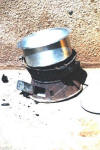 Joyce and I do the dishwashing honors tonight (all the group members take turns washing dishes for every meal). It’s
a bit of a long process, starting with heating the water for both washing and rinsing over a small charcoal “hibachi”. Then, while squatting down
on the cement patio, you fill two large bowls – one with about 2 quarts of hot water and soap, and one with about 2 quarts
of hot water and a capful of Clorox. You wash in the soapy water, and rinse in the Clorox water. At the start, the wash water is reasonably clean,
but when washing dishes and pots and pans for 11 people in just 2 quarts of water that is never changed, it gets pretty gross. Fortunately,
all food, regardless of whether it is breakfast, lunch or dinner, is served in a motley collection of plastic and dime store glass cereal-sized bowls,
with the only eating implement being a spoon, so the number of dishes is limited.
Joyce and I do the dishwashing honors tonight (all the group members take turns washing dishes for every meal). It’s
a bit of a long process, starting with heating the water for both washing and rinsing over a small charcoal “hibachi”. Then, while squatting down
on the cement patio, you fill two large bowls – one with about 2 quarts of hot water and soap, and one with about 2 quarts
of hot water and a capful of Clorox. You wash in the soapy water, and rinse in the Clorox water. At the start, the wash water is reasonably clean,
but when washing dishes and pots and pans for 11 people in just 2 quarts of water that is never changed, it gets pretty gross. Fortunately,
all food, regardless of whether it is breakfast, lunch or dinner, is served in a motley collection of plastic and dime store glass cereal-sized bowls,
with the only eating implement being a spoon, so the number of dishes is limited.
July 31, 2001
Several of us are awakened during the night by shouting and commotion in the distance. It appears that locals were trying to scare off the elephants from eating their farm vegetables. Night elephant foraging is a big problem in this area. The farmers lose approximately 75% of their crops to hungry elephants, which wait until dark to lumber in from the nearby areas. And there are limited ways for unarmed farmers to scare off the elephants – if lights and noise don’t deter them, which they usually don’t, there is no other way to get rid of them. An elephant that wants to be in your garden can most generally have its way. Monica says there are a few instances of locals being killed by the elephants – a drunk on his way home from the bar was apparently not polite enough to some elephants he encountered, and we later meet the young widow of a farmer killed by elephants last year.
It is gloriously sunny this morning, but also windy. After a breakfast of oatmeal, we set out for the worksite, about a half mile away. First we pass a broken down truck that Monica says has been parked there about 2 weeks. They’ve unloaded all the cargo, and one man has set up camp by the side of the road, while waiting for his partner to go off in search of the necessary repair parts. We’ve said hello over the past few days, and wave our usual morning greetings – “jambo”, or “habari”!
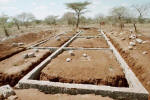
At the work site there are a half dozen men already mixing concrete, but no other apparent tasks for our group. After a short wait, John, one of the masons, asks us to collect rocks about the size of tennis balls. Since, as best I can tell, all of Africa is either dust, rocks or thorns, there is certainly no shortage of rocks and we collect them for over 3 hours.
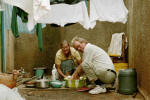 About 1:00 we return to the house for a delicious lunch of spiced cabbage, and a plantain/potato mix. After lunch,
we divide up our duties, with Marvin and I doing the dishes, then heading to the Angry Turkey well with Karen. Others
go for drinking water and have the unsettling experience of being stared down by a large baboon.
About 1:00 we return to the house for a delicious lunch of spiced cabbage, and a plantain/potato mix. After lunch,
we divide up our duties, with Marvin and I doing the dishes, then heading to the Angry Turkey well with Karen. Others
go for drinking water and have the unsettling experience of being stared down by a large baboon.
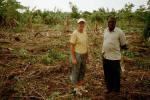
 Later in the afternoon, several of us visit Francis’ farm to witness the elephant destruction sustained the night before. The
area where he grew oranges and tomatoes and bananas is completely devastated, with trees snapped and downed as if lightning had struck, the ground
rooted and rutted with digging. The mangoes, beans, cabbage, kale, cassava and some weird Asian gourds are still intact, but
at least an acre or more has been totally destroyed.
Later in the afternoon, several of us visit Francis’ farm to witness the elephant destruction sustained the night before. The
area where he grew oranges and tomatoes and bananas is completely devastated, with trees snapped and downed as if lightning had struck, the ground
rooted and rutted with digging. The mangoes, beans, cabbage, kale, cassava and some weird Asian gourds are still intact, but
at least an acre or more has been totally destroyed.
Dinner is kerosene-flavored chapatis, with lentil hash and cabbage. Pretty good, except for the kerosene.
August 1, 2001
Our sleep was interrupted again last night by elephant chasing. The women are getting used to our natural morning alarm – soft, childish chatter gradually swelling to an intense, steady din. But there is an orderliness and politeness among these school children, who gather without any grownups a full hour before school starts, that is refreshing, and would be unthinkable in the U. S.
After our usual oatmeal breakfast, Karen and Joyce and all the guys head to the work site. Chris, Sam, Mariah and I go for water at the Angry Turkey well, but finding it locked, head to the Tiny Man well. We fill up four 5-gallon and two 2-gallon solar shower bags, and struggle valiantly to haul our heavy loads back to the house.
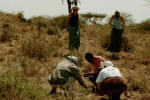 Once back, however we head out to the work site, where the crew is happily busy. The guys and Joyce have been doing some digging and concrete pouring.
But the rest of us have graduated from collecting tennis ball size rocks to smaller than golf ball size. It is almost Zen-like in its boringness, and we
alternate between the Zen state and finding word games or songs to break the monotony. Elephants were near the work site last night, and we can see a
tree that has been splintered and destroyed.
Once back, however we head out to the work site, where the crew is happily busy. The guys and Joyce have been doing some digging and concrete pouring.
But the rest of us have graduated from collecting tennis ball size rocks to smaller than golf ball size. It is almost Zen-like in its boringness, and we
alternate between the Zen state and finding word games or songs to break the monotony. Elephants were near the work site last night, and we can see a
tree that has been splintered and destroyed.
Lunch is – surprise! - beans and rice. After lunch, Chris gives Zach, who, like any overeager 21-year-old male did his shoveling at breakneck speed instead of slowly and steadily, a much needed massage. A few others take naps. In the mid-afternoon, Mariah, Marvin, Bill, Karen and I head for the drinking well, and find a momma and two baby monkeys, climbing and chattering in the nearby trees at the creek crossing.
Later, I do my first load of laundry, using only 2 precious gallons of water to wash 2 pairs of socks, 3 underpants and 3 T-shirts. The resulting water took the definition of “filthy” to brand new heights. There was no way I could actually get anything clean, like in the detergent commercials. I was actually only aiming for “mostly clean”, but settled for “improved”.
Dinner is kale and ugali again. There is a lot of PB & J supplementation this evening.
August 2, 2001
Marvin here. We have been “working” at the construction site 4 days. I shall try to describe the project and the hill they must climb before this clinic is a reality.
We are the fourth group. Prior to our arrival the foundation was completed. It is about 25’ by 75’. They have dug trenches about a yard deep, poured footers and laid block up to 18”. The building’s foundation has been cross divided into rooms about 12’ by 15’. Originally, I thought they were using crudely made solid concrete blocks because the cross section varied from 7” – 9” and lengths from 1’ – 4’. Talking with Francis today, I found out these are quarry stones from 50 kilometers away. That is why they are so rough – they have been chiseled out of a solid deposit by hand.
We have been somewhat handicapped lacking materials. More stone is required for another course of block on the foundation. It was to arrive today but didn’t. (Although it may just be en route, I am reminded of a large transport dead in the road outside of Maili Tatu since our arrival. The driver camps and waits for parts. Making a living driving these roads can be no easier than playing Russian Roulette with an automatic.)
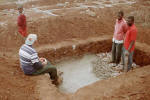 Anyway, we have passed the time making a water tank 5’ x 5’ x 7’ and gathering gravel for concrete. The project here is quite daunting, given the
data I have. The building will cost Ksh 2,500,000. We, a group of 10, donated 70,000 to the cause. It will take 34 groups to raise the cash.
At 3 groups a year, most of the committee members will require the services of the clinic by the time it is finished.
Anyway, we have passed the time making a water tank 5’ x 5’ x 7’ and gathering gravel for concrete. The project here is quite daunting, given the
data I have. The building will cost Ksh 2,500,000. We, a group of 10, donated 70,000 to the cause. It will take 34 groups to raise the cash.
At 3 groups a year, most of the committee members will require the services of the clinic by the time it is finished.
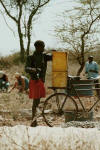 I am still trying to find out how much concrete will go into this building, but I do know that about 15 gallons of water is used with a sack of concrete,
according to the mason. The important thing to remember is the nearest water is a 15-20 minute round trip to the river by bicycle with two five-gallon
buckets strapped on the rear carrier. Without a well on the property, there will be a major investment in bike tires!
I am still trying to find out how much concrete will go into this building, but I do know that about 15 gallons of water is used with a sack of concrete,
according to the mason. The important thing to remember is the nearest water is a 15-20 minute round trip to the river by bicycle with two five-gallon
buckets strapped on the rear carrier. Without a well on the property, there will be a major investment in bike tires!
Today we broke down the dirt within the foundation and back-filled inside the perimeter. We were to fill to the second tier. Next will come another course of block leaving 18” for gravel/rock undergrading. A slab will be poured on top. The crowd picking up one inch or less gravel on the nearby hillside was grateful to learn that the backfill was to be purchased and they were not needed to collect the many tons required.
Lunch at about 1:30 is rice and beans. Then we gradually disperse – several for naps, a few to do laundry. I read for awhile while the dishwater is boiling; then Marvin and I do dishes.
Later, Bill and Mariah and I walk to the Tiny Man well to fill up 4 solar showers, and Nicholas gives us 2 more papayas. On our return, Lila is preparing to shower, but the chickens we’re having for dinner are prancing around in the shower room. Monica tells Lila not to worry – the chickens won’t care whether we shower with them or not, but none of us want their last vision to be of one of us naked, so we whoosh them out in the yard.
In addition to the chicken, we have ugali, cabbage, and beans for dinner.
August 3, 2001
This morning is cloudy and windy, and a bit colder than usual. After our oatmeal breakfast, the women head off to the market at Rombo. The men plan to do the dishes, then head to the work site.
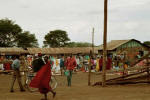
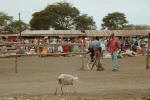 The walk to Rombo is 5 miles. Monica leads the way, through the village, to the road past the chief's house, and on
down the dusty road for almost 2 hours. When we reach Rombo, the square in the middle of town, a dusty open area bordered by
a crude wooden gate, is filled with people, mostly women, who have their wares spread on cloths on the ground. It
is a colorful collection of food and utensils. There are bananas, onions, tomatoes, oranges, avocados, potatoes,
cabbages, kale, cassava and other foods; cups and plates; congas (African wrap skirts) and other odds and ends.
Goats wander freely among the goods. We Americans are clearly the curiosities of the market as we mosey around.
The walk to Rombo is 5 miles. Monica leads the way, through the village, to the road past the chief's house, and on
down the dusty road for almost 2 hours. When we reach Rombo, the square in the middle of town, a dusty open area bordered by
a crude wooden gate, is filled with people, mostly women, who have their wares spread on cloths on the ground. It
is a colorful collection of food and utensils. There are bananas, onions, tomatoes, oranges, avocados, potatoes,
cabbages, kale, cassava and other foods; cups and plates; congas (African wrap skirts) and other odds and ends.
Goats wander freely among the goods. We Americans are clearly the curiosities of the market as we mosey around.
At a small store off the “square”, we find some Cadbury’s hard chocolate candies and Cadbury’s hot chocolate mix. You would have thought we’d died and gone to heaven – we swoop up those puppies before the shop owner knows what hit him.
We stop at Café Katharine for a coke – a busy place where they are starting to serve lunch – what looks like chai and rolled chapatis. On the wall is the ubiquitous, obligatory picture of the Kenyan president. There is also a sign that says “We gives the fast service no matter how long it takes.”
Then on to the hair salon where Monica gets a wash and straightening. With 8 of us huddled in the one small “salon” room, we watch the proprietress heat water on a small gas (?) burner, then wash Monica’s hair over a sink with no faucets, but a pipe that obviously drains the water through a hole in the wall outside. The radio blares more music of the type I have heard at Saita’s house – hyperactive, repetitive calypso-type songs. The business motto at the salon is “Pay cash, bargain less for a healthy nation”?????
Back at the market area, we follow Monica from vendor to vendor for a while longer. When we were finally ready to leave, Karen bargains for a truck ride back to Maili Tatu, and we are spared the walk.
In Maili Tatu, the guys have returned early from the work site, since the expected materials were not delivered. After lunch, we scatter as usual – some taking naps, others doing laundry, some reading or talking. Marvin and I decide to explore - past the Tiny Man well, following the gurgling creek past small farms and huts. We see lots of monkeys. Elephant droppings, damage and footprints are visible on the way back when we walk toward the drinking well road.
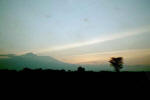 Now
it is early evening, and most of the group is socializing at the 2-table bar in Maili Tatu. This is my favorite time of day, when the work is done, you’ve
hopefully washed at least half of the dirt off your body the sun is gradually sliding behind Mt. Kilimanjaro, and a soft breeze begins to stir. If I
take a chair outside under the eaves of Saita’s house, and sit there reading quietly, the bats will eventually stir, start squeaking, then finally swarm
out of the roof, dive-bombing within inches of my head – the evening ritual that signifies nighttime has arrived and all is right with the world.
Now
it is early evening, and most of the group is socializing at the 2-table bar in Maili Tatu. This is my favorite time of day, when the work is done, you’ve
hopefully washed at least half of the dirt off your body the sun is gradually sliding behind Mt. Kilimanjaro, and a soft breeze begins to stir. If I
take a chair outside under the eaves of Saita’s house, and sit there reading quietly, the bats will eventually stir, start squeaking, then finally swarm
out of the roof, dive-bombing within inches of my head – the evening ritual that signifies nighttime has arrived and all is right with the world.
I take stock of my fingers and fingernails, stained so darkly with dirt that you’d think I dipped them and rubbed them for hours in brown ink. We’re scheduled to travel to Loitokitok for the weekend, and the group is really psyched. The lure of a hot shower, mouseless/lizardless beds, and food that doesn’t resemble rice and beans have us all atwitter.
August 4, 2001
It is a crisp, cold morning (of course that could have something to do with the fact that we‘re up much earlier to go to Kibo Slopes Hotel in Loitokitok). There’s no time for oatmeal, so we snack on peanut butter on moldy bread (we’re out of jelly).
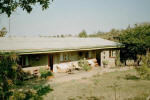 And finally the mini bus shows up. It has “Glory to God, the Umpire” painted in bold letters on the back window.
We bounce and bump our dusty way to Loitokitok in a bare 2 hours. Kibo Slopes is a delightful place, hidden just on the edge of town, with
low cottages and tiled verandas containing rattan lounge furniture. It has electric lights, hot water and flush toilets.
In the restaurant, there are tablecloths, and enough knives, forks, spoons and glasses for everyone to have one each of his very own.
We think we’re in heaven.
And finally the mini bus shows up. It has “Glory to God, the Umpire” painted in bold letters on the back window.
We bounce and bump our dusty way to Loitokitok in a bare 2 hours. Kibo Slopes is a delightful place, hidden just on the edge of town, with
low cottages and tiled verandas containing rattan lounge furniture. It has electric lights, hot water and flush toilets.
In the restaurant, there are tablecloths, and enough knives, forks, spoons and glasses for everyone to have one each of his very own.
We think we’re in heaven.
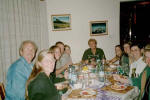 Lunch is in the large, high-ceiling, glass-enclosed dining room, decorated with African print tablecloths and cushioned chairs. We are served a
clear soup, fish, rice, cooked carrots and a delicious blend of green beans and onions. The vegetarians get fried eggs.
Lunch is in the large, high-ceiling, glass-enclosed dining room, decorated with African print tablecloths and cushioned chairs. We are served a
clear soup, fish, rice, cooked carrots and a delicious blend of green beans and onions. The vegetarians get fried eggs.
After lunch, most of the group heads to their cottages to luxuriate in the amenities. Mariah, Joyce, Bill and I set out for town to grab whatever groceries we can find in the “big city”. It is about a mile walk, and we find a store with most of what we need – 3 jars of peanut butter, 2 cans (not jars) of jam, 3 tins of tuna, 3 packages of toilet paper, 4 packages of soy-maize porridge (no oatmeal porridge available), some AA batteries, and some pineapple juice and cookies (biscuits here in Kenya) for the party we’ll have at the end of the week.
Dinner is beef tips in a sauce, small whole unpeeled roasted potatoes, carrots and cabbage, and a spiced pea-like vegetable instead of beef for the vegetarians. Delicious! Everyone is tired, and we retire early.
August 5, 2001
After a breakfast feast of papaya, Spanish omelet and toast with butter and jam, Bill, Mariah, Sam, Joyce, Zach, Marvin and I head for a guided hike in the foothills of Kilimanjaro. We drive to an Outward Bound camp, then trudge up through the hills, ultimately crossing into the evergreen forests of Tanzania. Then we gradually descend through small hillside farms back into Kenya, down into some gorges and a small waterfall on the Naromoru River. While the rest of us munch on cheese sandwiches and fried chicken provided by the hotel, Zach chases Colobus monkeys down the stream.
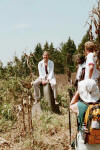
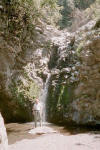
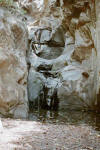
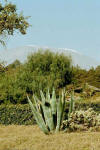 Back at the cottages by 3:00, I finish washing all my clothes, take a shower, and read. The sun is toasty warm on the veranda by late afternoon and the
pages of my book grow fainter and fainter. We catch up with the rest of the group on the dining room patio around 6:30, and have a terrific vegetable
spaghetti dinner. The moon is full tonight, and the air clear and invigorating.
Back at the cottages by 3:00, I finish washing all my clothes, take a shower, and read. The sun is toasty warm on the veranda by late afternoon and the
pages of my book grow fainter and fainter. We catch up with the rest of the group on the dining room patio around 6:30, and have a terrific vegetable
spaghetti dinner. The moon is full tonight, and the air clear and invigorating.
August 6, 2001
The day dawns gray and dreary, with that seeping dampness that just nestles right into you. We’re leaving today to return to Maili Tatu. It’s been a wonderful break, but we need to get back to our reason for being here – the health clinic.
The minibus, scheduled for 10:00, arrives at 11:30. For Kenya, that is probably counted as being on time. With stops in Loitokitok for bread and water, we arrive in Maili Tatu around 2:00. Monica assures us it was dull and boring in Maili Tatu without our lively chatter and constant comings and goings. She has lunch ready – rice and pea-beans.
After lunch, Marvin, Karen and Bill head to the work site to catch up on any new developments. Maria, Chris, Joyce and I go to the drinking well.
After a dinner of vegetable soup, we discuss how to express our concerns to the committee at tomorrow afternoon’s meeting. The group is discouraged with the pace of work on the clinic and the shortage of jobs for us. We understand and want to honor GCN’s philosophy of doing everything according to the community’s wishes and plans, but the progress is so slow, it is wearing on our American, Type-A minds. The group is torn between desperately wanting these wonderful people to have their clinic RIGHT NOW, and knowing that handing it to them the American way would be infinitely wrong. Not every one of us is completely convinced, but in the end, we decide to make sure the committee members know this clinic will take them 10 – 12 years to build, and if they are comfortable with that, then we must accept that too. However, we will offer them alternative fund-raising ideas, if they are receptive.
August 7, 2001
After a particularly warm night, Mariah and Chris create a tasty breakfast with leftover potatoes from last night, adding tomatoes, onions and eggs. Marvin and I wash the dishes, then walk to the work site to join the others. When we pass the broken-down truck, we see the new axle and differential assembly has finally arrived, which they are installing right there in the road.
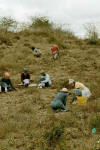 At the work site, there is a bit of digging, but most of us are on picking up rocks detail. We pass the time with some
word games, but most of the group seems dispirited, and conversation is sparse.
At the work site, there is a bit of digging, but most of us are on picking up rocks detail. We pass the time with some
word games, but most of the group seems dispirited, and conversation is sparse.
After a lunch of corn/beans/potato mixture that was extraordinarily tasteless, most of us make PB & J sandwiches. The 3:00 committee meeting finally begins around 4:00 with opening prayers. Francis explains that we are working on the first of 6 planned buildings. This first building alone will cost an estimated 3 million Kenyan shillings, and the entire complex of 6 buildings is estimated at 22 million. Currently, the only cash they have for this project is what GCN participants bring (approximately 7000 shillings per participant). The vegetables they grow in this area are their only cash crop, and, as we have already learned, this income is dependent on how hungry the elephants are, as well as rainfall and other whims of nature.
The committee members assure us they would love to finish building #1 of the clinic sooner than the 10-12 years they anticipate it will take, but they are at a loss to figure out how to do so. They have no money, very few materials, and even fewer tools. They repeatedly express their gratitude for our presence in Maili Tatu and our willingness to help.
A flood of emotion washes over me, tumbling, pitching and rocking me to the core. I blink back the mounting tears quickly, before being caught. How absolutely trusting and hopeful can a community be than to begin a 10 – 60 year building project with the sum total of 2 shovels, several 5-gallon pails, a few dozen local laborers and the promise of a few thousand shillings every few months from some obscure American organization? These people have more faith and patience than all of corporate America combined. How dare we berate them for not being more organized, for not having more materials available and ready just because we’re here for our precious 3 weeks and want to do something useful. In that moment, all my concern and anxiety about not having enough building work to do melts away, and I humbly accept their plans and timetables.
As we talk on, some of us suggest other sources of fundraising besides GCN, and the committee is eager for information. We also discuss the need for a well, which would significantly enhance their ability to obtain water for the construction. Finally, we talk briefly about how the GCN participants are limited in helping because most of the labor is skilled masonry work.
After the meeting people drift off in various directions – most going to the bar in town. Joyce and I sit outside Saita’s house, savoring the cool of the approaching evening and drinking in the delicate pink sunset over Mt. Kilimanjaro. But our peace is broken when a drunken Masai follows the others back from the bar and makes a pest of himself, shouting and spitting.
August 8, 2001
We’re awakened once again by the bright, carefree, clipped chatter of the small children gathering in the schoolyard. Mariah has 5 crickets inside her mosquito net – and they are clearly not there at her invitation. Yesterday, Sam didn’t zip up her suitcase when she went to bed, and this morning there is a mouse inside it.
Chris and Joyce and I decide to go for drinking water before breakfast, to beat the heat. The walk is much more pleasant, with a soft breeze, and the sun not yet insistently warm. Three young schoolgirls follow us for awhile – shy but curious, answering our questions with whispers and embarrassed giggles.
Karen makes the last of our oatmeal – it is grayer and runnier than usual, but still tastes good. Tomorrow we’ll have to start on the Kenyan soy-maize porridge we bought in Loitokitok.
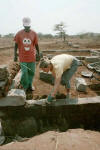 At the worksite we ready the next course of block for the foundation. We sort through the pile of quarry stone, searching for 9” by 9” by
any length blocks, and carry them over to the foundation walls. Then John (one of the masons) shows Joyce how to clean off the current
wall and wet it, and he shows me how to put the cement on the layer of block with the trowel. It is the best
part of the building project so far, and we are all excited to be doing something that finally represents building a clinic.
At the worksite we ready the next course of block for the foundation. We sort through the pile of quarry stone, searching for 9” by 9” by
any length blocks, and carry them over to the foundation walls. Then John (one of the masons) shows Joyce how to clean off the current
wall and wet it, and he shows me how to put the cement on the layer of block with the trowel. It is the best
part of the building project so far, and we are all excited to be doing something that finally represents building a clinic.
But it is short-lived. The committee has put together an excursion to Lake Challa, a volcanic lake an hour or two drive away, and the bus that was scheduled to arrive at noon arrives early. We rush back to our quarters and try to clean up a little (with wet wipes, since there is no time for showers). Our group of eleven, plus Monica and Grace, Moses, Joseph and a few other “chaperones” climb into the back of a pickup truck and we’re off to see the sights. Our first sight is a huge herd of elephants grazing near a village. There are at least 3 dozen of them – from gigantic males with large tusks, to playful babies.
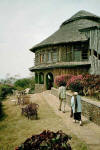
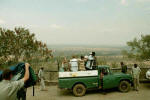 After several dusty, crowded hours in the truck, we finally arrive at the Lake Challa Hotel – a picturesque building at the top of a mountain,
overlooking a clear, glimmering lake in the crater of a volcano – our best photo op yet. After just a short stay there, we climb back into the truck
and head for the nearby town of Taveta, where it is market day. It is just like market day in Rombo, only 5 times bigger – with fruit
and vegetable products spread on cloths on the ground, and clothes and household products arranged in wooden stalls. Eventually
we find our way to the Challa Hotel on the outskirts of town. Although our hosts had supposedly arranged ahead of time for a luncheon
in the hotel dining room, we wait for more than an hour before our meal is served. And since it is close to 5:00 and we have been without lunch,
most of us are running pretty low on the energy meter.
After several dusty, crowded hours in the truck, we finally arrive at the Lake Challa Hotel – a picturesque building at the top of a mountain,
overlooking a clear, glimmering lake in the crater of a volcano – our best photo op yet. After just a short stay there, we climb back into the truck
and head for the nearby town of Taveta, where it is market day. It is just like market day in Rombo, only 5 times bigger – with fruit
and vegetable products spread on cloths on the ground, and clothes and household products arranged in wooden stalls. Eventually
we find our way to the Challa Hotel on the outskirts of town. Although our hosts had supposedly arranged ahead of time for a luncheon
in the hotel dining room, we wait for more than an hour before our meal is served. And since it is close to 5:00 and we have been without lunch,
most of us are running pretty low on the energy meter.
But the food is worth waiting for. The meat-eaters have roasted goat and french fries, with sliced tomatoes, and the vegetarians have a delicious soup of potatoes, cabbage and tomatoes. The hotel must have been a grand and sumptuous place at one time, but it has clearly lost its luster, and is now only comfortably frayed and homey.
The sky is growing dark when we climb back on the truck to return to Maili Tatu. We stop briefly in front of the Blessed Food Hotel and the Ndongo Purple Health Clinic so our driver can run a short errand, then we’re finally off into the desert. It is magical to watch the fading light over the vast scrubby plains, the graceful, squashed acacias, the solitary, robed Masai walkers, and the spiky thatched roofs against the graying sky. The #1 butt ache we all have from the ride is definitely worth the view.
August 9, 2001
Everybody’s butts are sore, and we have dust and dirt in every conceivable place from the truck ride yesterday – the dirt is even leaking out the corners of our eyes! Sam had smoothed on some sunscreen before the journey yesterday, and the dust just magnetically stuck to her so thick she looked like Aunt Jemima.
Joyce and I make the soy/maize porridge this morning. Joyce insists it will be improved the next time if we just add a little salt to the water and sugar during the cooking, but how can salt and sugar alter the taste of cardboard? One member of our group suggests we take it to the building site and use it instead of cement! On the other hand, PB& J is our only alternate choice, and the J is almost gone, and the bread is having its own troubles staying together and avoiding mold growth.
There isn’t much work at the site – even rock gathering is no longer needed. Several of us stay back to busy ourselves with chores – cooking, hauling water and walking to town to scrounge up some eggs, onions and avocados.
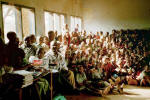
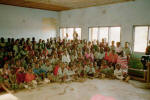 It is the last day of school, and the classes have prepared songs and dances and even a play for our group. At 3:00 we trot over to the schoolhouse,
where we’re seated on guest of honor school benches. Each of the classes, from kindergarten through Level 8, has prepared something for us – the younger
children sing a cute song about good habits (like washing your hands), the intermediate girls sing some soulful, gospel-like songs, the intermediate boys
dressed in Masai warrior garb chant to some simple choreographed footwork, and the older level puts on a drama about a Masai girl who was kidnapped by
the man her parents had promised she would marry, after she refused to marry him. Everyone performs with joyous enthusiasm and great heart.
It is pretty embarrassing for our group, when it comes time to reciprocate. We eke out “The Itsy Bitsy Spider” and “Michael Rowed
the Boat Ashore”. Although the children clap enthusiastically, it is more likely they are just glad we’re finished.
It is the last day of school, and the classes have prepared songs and dances and even a play for our group. At 3:00 we trot over to the schoolhouse,
where we’re seated on guest of honor school benches. Each of the classes, from kindergarten through Level 8, has prepared something for us – the younger
children sing a cute song about good habits (like washing your hands), the intermediate girls sing some soulful, gospel-like songs, the intermediate boys
dressed in Masai warrior garb chant to some simple choreographed footwork, and the older level puts on a drama about a Masai girl who was kidnapped by
the man her parents had promised she would marry, after she refused to marry him. Everyone performs with joyous enthusiasm and great heart.
It is pretty embarrassing for our group, when it comes time to reciprocate. We eke out “The Itsy Bitsy Spider” and “Michael Rowed
the Boat Ashore”. Although the children clap enthusiastically, it is more likely they are just glad we’re finished.
After all the performances, the schoolchildren linger on the grounds outside the school, but gradually everyone disperses. Some of our group heads for showers and doing laundry. A few go to town to buy flour. Dinner is rice and cabbage.
August 10, 2001
It is cloudy again this morning – we haven’t had a glimpse of Mt. Kilimanjaro since returning from Kibo Slopes. Monica makes “pancakes” this morning – a fried, flat, 8” round bread like a chapati, which we roll up with honey in the middle. Yummm.
Bill and Joyce and I walk to the Rombo market for essential provisions like cookies (biscuits), chocolate candy and hot chocolate (Milo). While there, we also buy spaghetti, pea beans and bananas. On the road to Rombo, we finally meet Jacinta, whom we had heard so much about. She invites us to her store in Rombo, a store just like the others – one room about 10 x 10, unlit and dark, with densely packed shelves around three sides. Her brother-in-law, Wilson, is there tending the shop. Then, later in the open market area, we see John, the mason, and his wife Joyce and son Isaac. And we also meet the government inspector who is on his way to Maili Tatu to inspect the clinic site. It is heartwarming to find so many friends in the area after only a few short weeks.
Back in Maili Tatu the broken down truck is gone – after 3 weeks of “camping” by the side of the road. We feel a sense of loss without our landmark. We also find the group has not worked at the site today because there was nothing to do. A special lunch with the committee members and the tribal chief is scheduled at 1:00, and it finally starts at 3:00. About 20 of us crowd elbow-to-elbow in Saita’s living room and feast on mounds of rice, potatoes, cabbage and goat. It is 3 times as much food as we’re used to, and no one can quite stuff it all in.
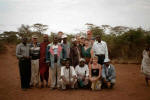 After the meal, there are speeches from the committee members, welcomes and expressions of appreciation, and reports on the status of the project.
After the more official parts of the meeting, we drift to other topics such as the problem of the elephants. The chief tells us that a study of this
area is scheduled. In Kimana, a town several dozen kilometers away, the government has installed an electric fence 30 kilometers in circumference to
keep out the elephants. There, the farmers harvest 100% of their crops. The scheduled study will determine whether such a fence should be installed in
the Maili Tatu area.
After the meal, there are speeches from the committee members, welcomes and expressions of appreciation, and reports on the status of the project.
After the more official parts of the meeting, we drift to other topics such as the problem of the elephants. The chief tells us that a study of this
area is scheduled. In Kimana, a town several dozen kilometers away, the government has installed an electric fence 30 kilometers in circumference to
keep out the elephants. There, the farmers harvest 100% of their crops. The scheduled study will determine whether such a fence should be installed in
the Maili Tatu area.
By 5:00, the committee members have headed to their various homes and duties, and our group members have scattered to do various chores or personal items. Here in our last few days, with little clinic work to do, we are at loose ends. It seems the days have been reduced to eating, carrying water, reading and waiting. Showering, waiting, eating. Talking, carrying water, visiting, eating and waiting. Waiting and waiting.
We’ve had so much to eat that we ask Monica not to cook any dinner. Those who are hungry snack on tangerines, bananas and PB & J. Then at 7:00ish our group gathers for the big Charades playoff. The Tuskers team had demolished the No Mercy team several nights before, and the No Mercy team had begged and whined for a repeat match. It is a rousing and heated game, with the Tuskers stomping the No Mercies in regulation play, but the No Mercies engineering a lucky win in the final moments of "overtime".
August 11, 2001
We are awakened by a cacophony of living creature sounds – lizards slapping against the tin roof, proud roosters, twittering birds, and other assorted unknown wildlife. Small bits of the roof fell in during the night, and Joyce was once again protected from the falling debris by her mosquito net.
I’ve sunk to the lowest level of being ever. My blood pressure must be down to 80/60. I’m melting, fading into the vast African landscape, becoming a shade of neutral brown. Life has become an endless cycle of hauling water, doing chores and hanging out. The rhythm of it all is seeping inside, and Africa is beginning to claim me. We have 3 more days of this nothingness schedule, and I’m trying not to care. As opportunities to do something arise, I grab them like a lifeline – cutting onions for the potatoes Chris fries for breakfast, doing the dishes with Joyce, joining the group going to haul water. But the hours plod by ever so slowly.
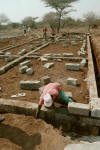
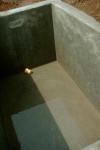 This morning we hang around the house. There is no work at the building site, and most of our chores are done. Shortly after lunch, Joseph and
another villager stop by to take us to a Masai celebration. It is more than a mile through the fields, and across 3 creeks, but we finally arrive
at the manyatta (small Masai village) in the early afternoon. Three girls and two boys (about 14 years old) had been circumcised that
morning. They are now secluded in a nearby hut, and will not emerge for about 3 days. But the village men have clearly been celebrating on their
behalf for some time, and are getting a bit rowdy. A fight breaks out, and some of the men begin beating wildly with their long
walking sticks. Joseph and Saita direct us to climb over a fence and wait outside the manyatta for safety.
This morning we hang around the house. There is no work at the building site, and most of our chores are done. Shortly after lunch, Joseph and
another villager stop by to take us to a Masai celebration. It is more than a mile through the fields, and across 3 creeks, but we finally arrive
at the manyatta (small Masai village) in the early afternoon. Three girls and two boys (about 14 years old) had been circumcised that
morning. They are now secluded in a nearby hut, and will not emerge for about 3 days. But the village men have clearly been celebrating on their
behalf for some time, and are getting a bit rowdy. A fight breaks out, and some of the men begin beating wildly with their long
walking sticks. Joseph and Saita direct us to climb over a fence and wait outside the manyatta for safety.
When the brawl is over we climb back over the fence into the manyatta again. But a drunk older man comes over to Lila and starts playing with her hair. Eventually she manages to scoot out of the way, so he starts playing with mine. It is quite unsettling, because he clearly isn’t interested in the difference in color and texture of our hair. We opt to climb back over the fence and wait outside the manyatta again. We’re waiting for the dancing that is supposed to take place, but for some reason they decide there will be no dancing today, and we leave soon after, quite disappointed to miss such a cherished event.
Upon returning to Saita’s, we discover we’ve locked ourselves out of the house. With great pains and some finagling, we hoist Purity up to a window where she can reach through and lift the key off a hook on the wall with a pole. It takes 15 minutes and at least 5 “technical advisors”, but she finally retrieves it, to our great relief.
Joyce and Marvin and I make guacamole with 5 huge and wonderful avocadoes. Bill and Mariah take chapati-cooking lessons from Grace and deliver about 20 wonderful tortilla-like chapatis. Joyce mixes up a small bowl of chili from a package we bought in Nairobi. To top it off, Zach goes to town and buys Tuskers, Cokes and Fantas. And that is our yummy dinner.
The two-inch roach in the latrine tonight doesn’t want to scurry back down into the poop hole when I shine my flashlight at him. I chase him with it for several minutes and then finally give up, holding my butt cheeks just high enough over the hole to make sure he won’t climb onto me.
August 12, 2001
The crazy animal-sounds parade is at it again – bright and early at 6:00ish this morning. Karen and Joyce and I had a relatively sleepless night. The mouse must have eaten too much salty or dry stuff the previous week and was apparently desperate for liquid. He spent the night making brittle, crackling noises trying to gnaw his way into the lotion bottle on Mariah’s shelf. When we shooed him away from that, he attacked Karen’s water bottle. After we hung Karen’s bottle on a hook from the ceiling, he went back to the lotion. Once, when we’d finally drifted off to sleep, Mariah woke up screaming that he was in her bed.
It is time to take bolder action. Marvin and Joyce design and build a Kenyan mouse trap. It consists of a large plastic bowl about 20 inches in diameter, filled with water. In the center of the bowl is a floating scrap of wood with a dab of peanut butter in the center. It is topped off with another small piece of wood angled from the floor up to the lip of the bowl, serving as a ramp. Joyce volunteers to empty the bowl when the mouse is caught.
The slow motion countdown continues. Most of us are marking time, but Zach thinks he may have lined up a giraffe hunt. We are all keying off his excitement. This is the 7th day in a row I have worn this skirt. I skipped wearing it last Sunday, but wore it 6 days in a row before that. I’m pretty doggone tired of it – and I brought it to Africa because I didn’t like it all that well in the first place. It is too dusty to bother cleaning at this point, and, what the heck, it matches the rest of my body. But if I arrive home in the U. S. and find my house burned down and all the clothes in my closet gone up in flames, I still won’t wear this skirt.
Today’s entertainment starts with a walk into town before breakfast to buy sugar, because we’re having cardboard porridge again and need something to fool us into thinking it is something else. We find 4 small eggs to add to our collection of 9 – maybe we’ll finally have enough for breakfast tomorrow morning. Several of the group members put bananas on their porridge and declare it quite tasty. I just think they’ve all lost their taste buds.
Several of us hike to the Angry Turkey well after breakfast, but it is already out of water, so we trudge to the Tiny Man well. Then, Marvin and Joyce and I go to the drinking well, seeing some monkeys at the creek on the way back. After a morning of hauling water, the spaghetti Chris cooks for lunch, with homemade tomato sauce, really hits the spot.
This afternoon the volunteers have a party for the people of Maili Tatu. We had bought 300 cookies and gallons of fruit drink, but discovered too late that in Kenya, these refreshments were suitable only for children. An adult party would have roasted goat. Thus, the schoolhouse is filled with a hundred or more children, dressed in their Sunday clothes. A smattering of adults gather in the dirt yard outside, but will not come in. Sam and Zach teach the kids to play Fox and Geese, and there is cheering and merriment among all.
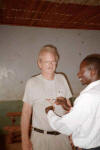
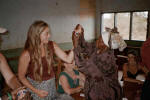 Later in the afternoon, the committee members call an impromptu meeting. Francis provides an itemization of all the materials our contributions have
bought. Then we discuss the materials needed to finish the slab. Finally, the members give each of us a piece of Masai jewelry – mostly
beaded necklaces of various patterns, but Karen and I get matching bracelets.
Later in the afternoon, the committee members call an impromptu meeting. Francis provides an itemization of all the materials our contributions have
bought. Then we discuss the materials needed to finish the slab. Finally, the members give each of us a piece of Masai jewelry – mostly
beaded necklaces of various patterns, but Karen and I get matching bracelets.
Just about dusk, we headed out on the 4 kilometer walk to Jacinta’s where we’ve been invited for dinner. We meet her husband Daniel, a former politician, now a social worker, her sons Jeremiah and John, and her daughter Purity. The house is a very pleasant surprise. It has electricity and a dining room. So we sit around the dining room table, where we can actually see everyone else in the light. And we have veritable feast of chapati, rice, boiled potatoes, boiled cabbage, and greasy beef and chicken, and a very sweet tea with milk in it. We even have plates and forks and spoons.
Jacinta and Daniel are an extremely extroverted couple who know no strangers. They have taken in a number of children to raise and educate as their own. And they have friends in every part of the world – people they’ve met on the streets in Rombo, in Nairobi, through GCN. We pore over photographs of their family and friends, even their wedding, exchange addresses, then give our profuse thanks before bidding them goodbye.
August 13, 2001
The mouse trap is successful! We catch 2 mice! But we neglected to anticipate that the mice might slip into the water and take hours to fail their first swimming lesson. No one wanted to empty the bowl in the middle of the night, so poor Mariah, who couldn’t stand listening to their struggles, dragged her sleeping bag into her sisters’ room to share their bed for the remainder of the night.
We’ve collected 13 tiny eggs over the last several days, so we scramble them and fry up the rest of the potatoes for breakfast.
There is almost no food left – the 2 loaves of bread are moldy, there is no hot chocolate, only ½ jar of Kenyan peanut butter, no bananas, no nuts. We DO have some tea bags, 3 boxes of cardboard porridge, and some salt, sugar and pepper. Mariah and I head to town to see what we can scrounge up. We find rice and beans for lunch, and cabbage for a vegetable soup for dinner.
But we need more food, so Joyce and Marvin and I head for Rombo late in the morning. It is particularly hot and sunny, maybe the hottest day so far. The dust is its usual glorious self – swirling, choking everywhere at the least breeze, bike or goat passing by. The road is an apparent social recreation center – we meet Anthony the chief, who insists that Marvin use his walking stick for such a long journey into Rombo, Peter the headmaster of the school who is pedaling by on his bike, John the mason’s boss, and some of Jacinta’s children on their way from visiting their grandmother.
The heat is brutal, and we stop several times to drink water from our bottles. At Rombo, we find onions, pea/beans and bananas at the central plaza. At two different stores on the perimeter, we purchase eggs – 9 from one store and 6 from another. There are no cartons for the eggs, and each is carefully set in plastic bags for the journey home. After a rest stop at Katherine’s Cafe for a Fanta, we take the road back to Maili Tatu. A small boy of about 6, shepherding his ragtag band of goats, follows us for the first mile, shouting in his high, chirpy voice “How are you?” The first twenty times we answer him, but it doesn’t deter his asking again, so we finally give up. Those were obviously the only English words he knew. Three dusty Americans trudging down the road, followed by a herd of goats and a small boy chirping “How are you? How are you?”
It is the heat of the day, and the sun is scorching. We plod along, taking short breaks in the shade and finishing up the meager supply of water from our backpacks. Around 5:00 we finally stagger back into the village – tired, hot and thirsty. Chris, Sam, Lila, Zach and Bill have gone to Francis’ house to taste his sugar cane. Karen and Mariah are at Saita’s house reading. I take a shower and renew my energy and general faith in mankind.
Dinner is the vegetable soup we worked so hard for today - made with our cabbage, pea/beans, tomatoes, onions and potatoes. Zach and Bill make a trip into the village to buy Cokes, Fantas and Tuskers for our celebratory “last supper”.
August 14 - 15, 2001
I had a mostly sleepless night. Another mouse was glomming up on whatever we’d left on the floor, and Sam thrashed wildly, had animated conversations with unknown characters, and popped her body joints in her sleep. For breakfast, Chris and Mariah fry up our precious eggs, and we have fresh papaya. We clean up the living area as best we can, burn our trash (no garbage and sanitation service here), and do our final packing. Then, farewell hugs and wishes to Monica, Grace and Saita, and other committee members and villagers who gather around. Monica and Saita were wonderful hosts – turning over their home to us, answering our interminable questions, helping us understand the customs and ways of their country without judging our own ways (usually) as strange and bizarre.
There are things I’ll miss here – the bright chatter of the school children in the early morning, the cool twilight hours outside Saita’s house, the majestic views of Mt. Kilimanjaro, and the general craziness and chaos of life in rural Africa – but the days here have dwindled down to monotony without any building work, and it is time to move on.
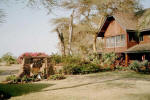 We’re headed to Amboseli National Park – one of the game parks from which so many elephants wander to raid the farmers’ fields at night.
It is a 3-4 hour drive from Maili Tatu, but as soon as we enter the park, we see more wildlife – grazing zebras and gazelles, proud ostriches propelling
across the road on their powerful legs, ambling wildebeest. Ol Tukai Lodge, where we are staying, is a sumptuous palace compared to
our previous accommodations. Although the rooms are a bit seedy, with frayed towels and chipped and stained toilets and sinks, we HAVE sinks and toilets,
and there’s hot water, and electric lights after 6:00 pm. We have porch patios, overlooking landscaped grounds with flowers and gardens and stone
pathways. The common rooms are high-ceilinged, with rich, deeply polished wood and stone, and graceful African carvings and rich motifs.
We’re headed to Amboseli National Park – one of the game parks from which so many elephants wander to raid the farmers’ fields at night.
It is a 3-4 hour drive from Maili Tatu, but as soon as we enter the park, we see more wildlife – grazing zebras and gazelles, proud ostriches propelling
across the road on their powerful legs, ambling wildebeest. Ol Tukai Lodge, where we are staying, is a sumptuous palace compared to
our previous accommodations. Although the rooms are a bit seedy, with frayed towels and chipped and stained toilets and sinks, we HAVE sinks and toilets,
and there’s hot water, and electric lights after 6:00 pm. We have porch patios, overlooking landscaped grounds with flowers and gardens and stone
pathways. The common rooms are high-ceilinged, with rich, deeply polished wood and stone, and graceful African carvings and rich motifs.
Meals here are buffet style on a 30 foot table, with soup, assortments of salads, rolls, vegetables, meats, rice and pastas, and desserts. Elegant waiters and waitresses serve your choice of beverage. The number of choices is incomprehensibly overwhelming. From one bowl of rice and beans eaten with a spoon while crowded into a dark living room, to an expansive feast served on matching dinnerware in an airy, elegant dining room! We feel both guilty and joyous all at once, and we fill ourselves with way too much food, as though we’ll never have another chance.
There are early morning and late afternoon game drives, and we see grazing, playful elephants, menacing cape buffalo, a family of lions and cubs lazing in
the late afternoon sun, 2 partially hidden cheetahs, hyenas, gazelles, zebras, and an assortment of birds – ibis, flamingo, storks
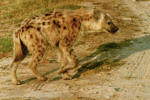
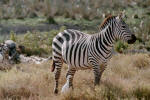
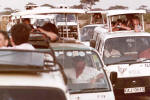
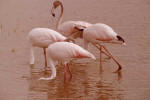
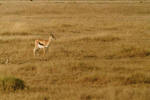
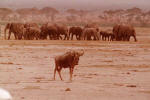
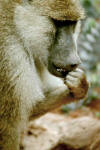

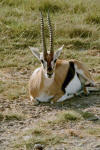
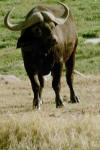
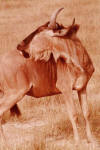
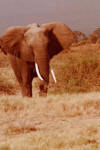 The second day, we see a lion kill in the chilly morning, and witness a group of 7 elephants gradually forage their way through the fields and cross the
road not 20 feet in front of us. It’s easy to fall in love with these playful, plodding giants, and forget the terrible devastation they cause to
farmers all over rural Kenya.
The second day, we see a lion kill in the chilly morning, and witness a group of 7 elephants gradually forage their way through the fields and cross the
road not 20 feet in front of us. It’s easy to fall in love with these playful, plodding giants, and forget the terrible devastation they cause to
farmers all over rural Kenya.
One morning after we return from our game drive, Marvin and I are sitting on the patio outside our room. A baboon saunters up to the room next to us where Joyce and Karen are staying, and decides to invite himself inside. Once inside, he checks out their luggage for interesting bits of food, finally choosing a package of tunafish from Joyce’s suitcase. By this time, Joyce has emerged from the bathroom, and Bill and Marvin have entered the bedroom, and the three of them conspire to shoo him out. The baboon drops the tunafish after Joyce throws a book at him, but he holds on to a piece of chocolate candy, and boldly pauses on the pathway outside to unwrap it, put it in his mouth and leave with an in-your-face swagger.
August 16 -17, 2001
And then it’s time to return to Nairobi, along the crazy, diesel-infested Mombasa – Nairobi road. We take a short time out to fix our third flat tire of the trip, and stop at an African craft store for last-minute souvenirs, finally reaching the bustling city of Nairobi as darkness is settling in. We all have different schedules for return flights the next morning, so our farewell meal is at a Chinese restaurant several blocks from our hotel. Chris and Mariah and Sam and Lila have already parted from the group, joining their husband/father Mark to stay on at Amboseli and other parts of Kenya for the next 10 days. Fred will stay on in Nairobi for a week or two. Bill and Karen will head back to their jobs in the states. Joyce and Marvin and I will spend 4 days in Amsterdam before returning to the U. S. We’ve shared a lot together and grown genuinely fond of each other. We’ve each drawn something unique and special from experience in Kenya and our stay in Maili Tatu. We talk about whether we will return to work on the clinic in the future, while simultaneously dreaming of soft beds and hot showers. We hug and wish each other well.
For me this venture was truly an exercise in respecting another culture. I eagerly anticipated helping a local Kenyan community achieve its goal of building a health clinic. Instead, I got to bide my time gathering rocks from the hillside, haul drinking water, walk miles to find food, sleep with bats, mice and lizards, have my life dictated by the sunrise and sunset, and live according to Kenyan customs and ways of doing things. I was solidly confronted with ceasing the “American” method of thinking and doing in order to respect the people and culture of Maili Tatu. In return, I have hundred of precious memories - from eager, curious children to the wild African landscape to strange foods and living conditions to sharing precious moments with fellow volunteers. For these I say in Kiswahili, “asante, asante sana” (thank you, thank you very much).
Masai children, women and young warriors in traditional dress often visited the work site.
